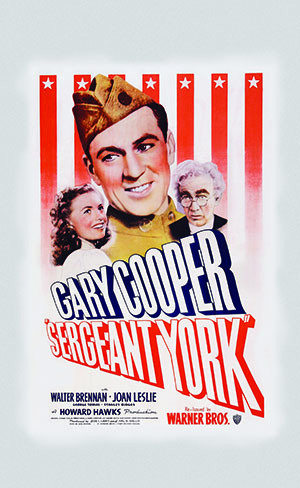
On October 8, 1918, Sergeant Alvin York captured 132 German soldiers and killed at least 20. For this feat—perhaps the most dramatic action by a soldier in American history—York received the Medal of Honor and instant fame.
Although York committed this deed during the First World War, he is also relevant to the Second World War, thanks to the film Sergeant York, directed by Howard Hawks and released in July 1941—a few months before Pearl Harbor. The movie was an instant hit. “Sergeant York Proves One of the Season’s Great,” blared the Washington Post. Famed New York Times film critic Bosley Crowther called it “a brave and sincerely wrought biography” and an “honest saga of a plain American who believed in fundamentals and acted with clean simplicity.”
The film went on to win two Academy Awards (including the Best Actor award for Gary Cooper in the title role) and became one of the highest-grossing motion pictures, when adjusted for inflation, in the history of American cinema. A 1942 poll of 548 critics placed Sergeant York in second place for “best picture” on a list of films released between November 1, 1940, and October 31, 1941, just behind Gone with the Wind. In another 1942 poll, the movie-going public rated it the “best-liked film” of 1941.
The film was beloved because of Cooper’s memorable portrayal of York as a kind of cornpone Everyman who leads a raucous life in the Cumberland Mountains of Tennessee until a freak accident—a lightning strike that destroys a rifle he is carrying and nearly kills him—convinces him to join the local hardscrabble church of Pastor Rosier Pile (Walter Brennan). (The lightning bolt incident was one of many liberties the movie took with the actual facts of York’s life.) Pile takes literally the Biblical commandment, “Thou shalt not kill.” So York does, too—and when America enters the Great War, is horrified to learn that he must enter the army, having been rejected for conscientious objector status.
During basic training at Camp Gordon, Georgia, York earns a reputation as an obedient soldier and a deadeye marksman, effortlessly achieving bullseye upon bullseye. Yet he stubbornly retains his pacifist beliefs. Then two officers attempt to persuade him to fight. Captain Danforth (Harvey Stephens), a committed Christian, trades Bible verses with York, with Danforth quoting verses suggesting the Bible does not forbid participation in war and York one-upping him each time with verses that insist upon on the complete rejection of violence. Then Major Buxton (Stanley Ridges), intently observing this scriptural duel, steps in and hands York a book on American history. It’s a book about freedom and the price of freedom, he says, and the creation of a government “whereby all men were pledged to defend the rights of each man, and each man to defend the rights of all men. We call it government of the people, by the people, and for the people.”
“You done given me a powerful lot to be a-thinking about,” York responds. Buxton gives York a 10-day furlough to go home and think it over. If York returns unpersuaded, Buxton promises, he will see to it that York is discharged. (Historically, York was instead promised a noncombatant slot.) York does go home. Then, high on a mountain ledge, he ponders his dilemma, with the opposed words of Major Buxton and Pastor Pile echoing in his head until they boil down to “God! Country!” A breeze catches the pages of York’s open Bible and flips them to the page containing Jesus’s injunction, “Render therefore unto Caesar the things which are Caesar’s; and unto God the things that are God’s.” York interprets this to mean that he must fight and, later, in a blazing 15-minute segment of the film, he does just that, in the process achieving the feat that will result in his award of the Medal of Honor.
Few moviegoers failed to grasp that Sergeant York was implicitly an argument to reject isolationism—the precise point that producer Jesse L. Lasky sought to convey. York’s film screen journey from committed pacifist to martial hero eloquently illustrated the shift in policy that Lasky believed the United States must make. Ironically, isolationism had been York’s own position in the run-up to war. But by the time the film was released in July 1941 he had changed his mind, and in a series of public appearances vocally condemned isolationists such as Senator Burton K. Wheeler, a Democrat from Montana, whom York derisively called “Neville” after British prime minister Neville Chamberlain, the architect of appeasement: “The senator ought to know by now that you can’t protect yourself against bullets with an umbrella.” But the film made the point far more effectively. It was, as Time magazine put it, “Hollywood’s first contribution to the national defense.”✯





